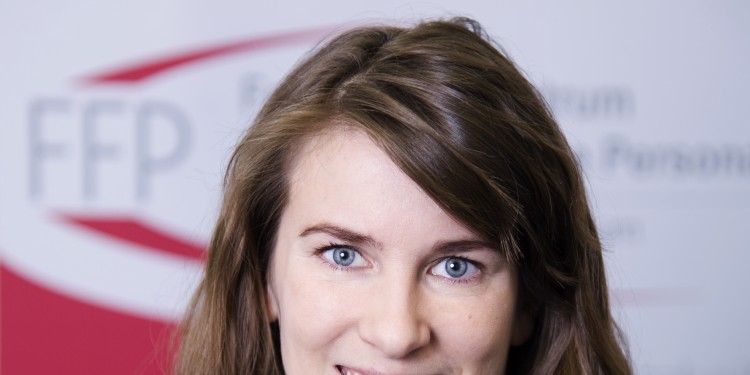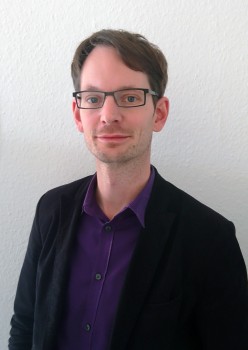
Three members of the University staff talk about parental allowance
Christine Deters (32), studied Sociology and Cultural and Social Anthropology and now works in the University’s research centre for Family-Friendly HR Policies:
"Starting a family while you’re still a student entails special challenges. This is what my husband and I discovered, because our two children were born during the time I was studying. In 2011 we confidently embarked on this for the first time and, as with most parents, there were a few questions to think about. Who is going to take parental leave when, and for how many months? As a student, am I entitled to parental allowance? What level of income do the various options produce? Apart from having enough time for the children and sufficient income, there was a further criterion: I didn’t want to interrupt my studies. After a lot of thought and after getting some advice we decided to take 14 months’ parental leave with the parental allowance. The way we split it up was that I stayed at home for the first three months, and my husband did so for the next eleven months. We were fortunate in that our child was born at the end of the semester, which meant that my parental leave coincided almost completely with the university holidays.
Apart from the time factor, the question of finances plays a major role for students with children – for me, too. If you receive a student grant you are entitled to get parental allowance. Although it’s not a benefit to cover loss of earnings, such as anyone in employment receives, you still get 300 euros a month – which are not deducted from the student grant. For us, the money came in very handy.
It becomes difficult for students with children in any situation in which a grant is no longer paid. This is the case when someone takes a semester off, or when the period of parental leave follows on directly after graduation. I think statutory regulations to cover such cases would be welcome. On balance, our experience with parental allowance has been predominantly positive. So much so, that we’ve taken on the challenge a second time."
Mirko Zumdick (36) works as a gardener in Department 4.3 (Technical Facility Management)

The financial support is a good thing and helps to cover some of the daily expenditure. After all, the everyday cost of living still has to be met. At that time, for example, we were building our house. Parental allowance can’t be compared to a normal salary, of course, but every extra bit of money helps – which is why my wife and I were pleased with the level of parental allowance we received. Where I see room for improvement, though, is in the process of applying for it. It was quite a lot of work, and one of the main problems I had was in submitting my salary statements because we University staff don’t automatically get such a statement every month – only when there are changes, such as the payment of an annual bonus. I had to explain this procedure in several phone calls, because the people in admin didn’t believe me. That was a laborious process which involved a lot of running around. Still, I’ll apply for the parental allowance again in 2017 and stay at home for two months, because this year our second son was born."
Dr. Jens Taken (38) works in Department 1.4 (Quality of university teaching) as an accreditation and degree course development officer:

The decision to stay at home was taken relatively quickly. After all, that first year only happens once and the chance never comes again. Another reason why it was easy for me was that Münster University provided support at all levels – from the head of department and the section leader to the HR department and colleagues.
The parental allowance is a means to an end, so to speak – and a good one. Financially, it enables couples to take a relaxed approach to starting (and enlarging) a family because you know that the first year isn’t going to be a problem as far as money and looking after your child are concerned. In my view, the increase in the birth-rate that we’ve been seeing recently in many towns and regions in Germany is due to no inconsiderable extent to the introduction of parental leave and the parental allowance.
The big problem that all parents have after the parental allowance stops is to find a place for their child in a child-care facility. Although there’s a statutory entitlement to child-care from the child’s first birthday onwards, places are only allocated at the beginning of the child-care year in August. Strangely enough, not all children are born and have their first birthday on the 1st of August … As a result, there are sometimes big time-gaps to be filled, quite apart from the basic problem of trying to find child-care places in Münster. So Münster University, as a large employer in Münster, would do well to start up in-company child-care facilities."
Suggested reading: Nowadays, parents have recourse to a wide range of support to help them achieve a work-family balance. This includes the parental allowance, which was introduced by the German parliament exactly ten years ago, in 2006. "A successful driver" is how Prof. Irene Gerlach, Head of the University’s research centre for Family-Friendly HR Policies, describes the parental allowance, which has the character of a benefit covering loss of earnings, and the extension of parental leave to 14 months, with both parents taking turns to look after their child. Within a short space of time, she says, the percentage of fathers among those making applications has risen to over 32 percent. "Even though most of these fathers only take parental leave for two months, what we can see here is a re-assessment of the values and roles involved in parenting," says Gerlach. The increase in the number of births from 1.34 per woman in 2005 to 1.47 in 2014 also indicates a 'change in thinking as regards family policy in Germany', she adds.
Irene Gerlach is the editor of the sociological study "Elternschaft. Zwischen Autonomie und Unterstützung" ("Parenting. Between Autonomy and Support"), which has now been published by the Springer Verlag (ISBN 978-3-658-16032-6, Price: € 44.99)
This article first appeared in the University newspaper "wissen|leben", No. 8, 14 December 2016
Translated from German by Ken Ashton
